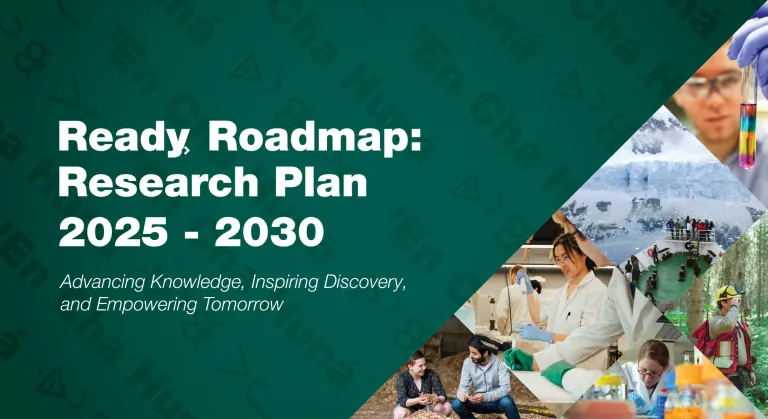
Advancing knowledge, inspiring discovery, and empowering tomorrow.
Strategic research areas
At UNBC, we are committed to advancing knowledge and fostering impact through a diverse spectrum of applied, community-driven, discovery-oriented, and interdisciplinary research. Through this, we work to tackle the complex challenges of today for an empowered tomorrow.

While not exhaustive of the broad scope of research and innovation at UNBC, five strategic research areas were crafted to represent the core domains of our research and impact.
We recognize that these strategic research areas will be enhanced by boundary-crossing work that reflect intersections and synergies across themes, further drawing upon our commitment to integrative and collaborative approaches to research.
The five strategic research areas are:
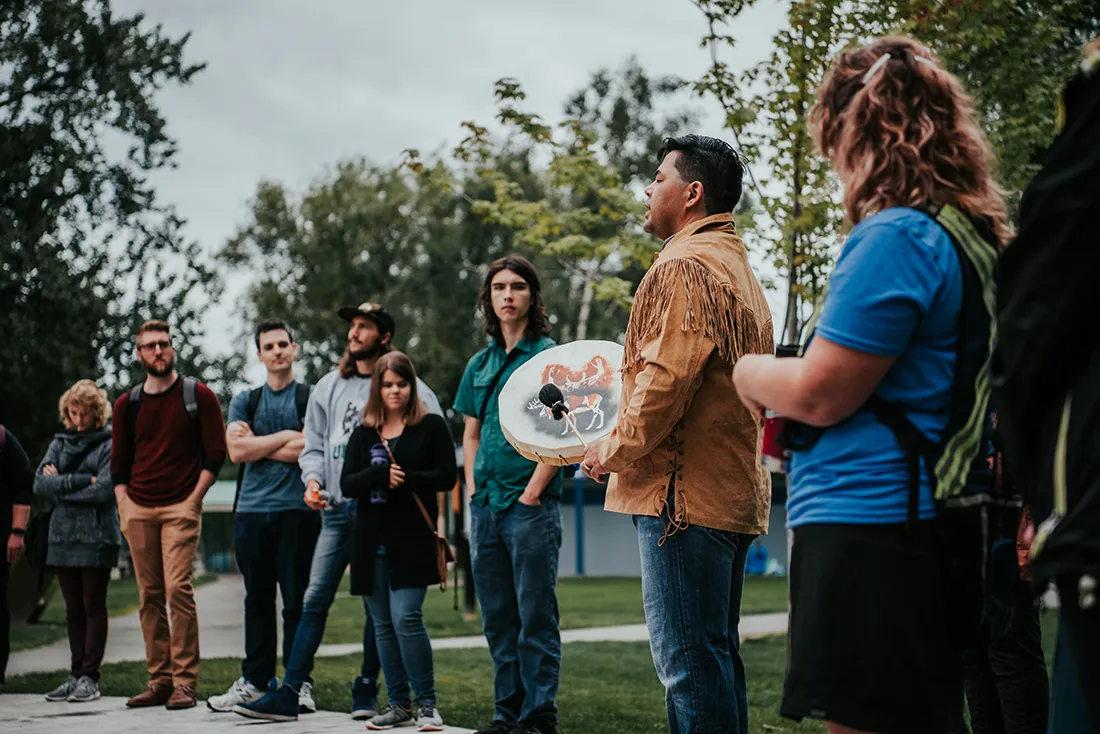
Northern British Columbia is home to many Indigenous Peoples, encompassing diverse communities and linguistic groups. UNBC also has a growing community of Indigenous scholars, students, and leaders, with over 10% of all students identifying as Indigenous. UNBC is actively working to support authentic, meaningful, respectful, and reciprocal partnerships with Indigenous communities and to act on truth and reconciliation. The university acknowledges a special responsibility to the First Nations in its service area in terms of education, research, and economic development, as well as in supporting Indigenous communities in their self-governance and creating meaningful opportunities for knowledge exchange between Indigenous and non-Indigenous peoples.
Indigenous scholars, researchers, and students at UNBC work collectively with Indigenous communities and organizations locally, nationally, and internationally, recognizing the importance of diverse knowledge systems and worldviews when addressing complex challenges and priorities. Of note, UNBC is home to the National Collaborating Centre for Indigenous Health (NCCIH), with researchers establishing broad partnerships to support Indigenous public health renewal and health equity. Likewise, natural resources and plant ecology researchers work on land based projects to gather historical insights and provide future solutions.
Example research areas
- Design and application of Indigenous-informed and led environmental science, resource management, and planning strategies.
- Understanding definitions and drivers of Indigenous health and wellness, and how to improve them.
- Preservation and revitalization of Indigenous languages and cultures.

Resource extraction and climate change continue to have significant impacts on ecosystem function in our region and beyond. These impacts are especially acute in northern B.C., where many communities are reliant on resource-based economies and are vulnerable to environmental disasters and climate events, such as extreme heat, wildfires, floods, and landslides. Responsible stewardship of resources and the natural environment requires an advanced understanding of our rich natural heritage and drivers of environment and climate change.
With a dynamic landscape of cutting-edge research infrastructure and sites, including research forests, rivers, labs, and sustainable energy initiatives, UNBC has developed an international reputation for research that examines both the human and natural dimensions of natural resources and environmental sustainability. Of note, the Natural Resources and Environmental Studies Institute (NRESi) provides critical infrastructure to advance environmental and natural resource-related research. NRESi engages scholars from across the spectrum of natural, physical, and social sciences and humanities research, by supporting research that extends from molecular to global scales.
Example research areas
- A highly developed understanding of the fundamental workings of natural systems: their complexity, resilience, adaptive capacity, economic impacts, and sustainability especially with respect to the impacts of human pressures.
- Identification and integration of sound social, economic, and ecosystem principles for natural resource management and environmental protection.
- Design and application of new products and technologies for economic diversification and sustainable management, extraction, and processing of natural resources.
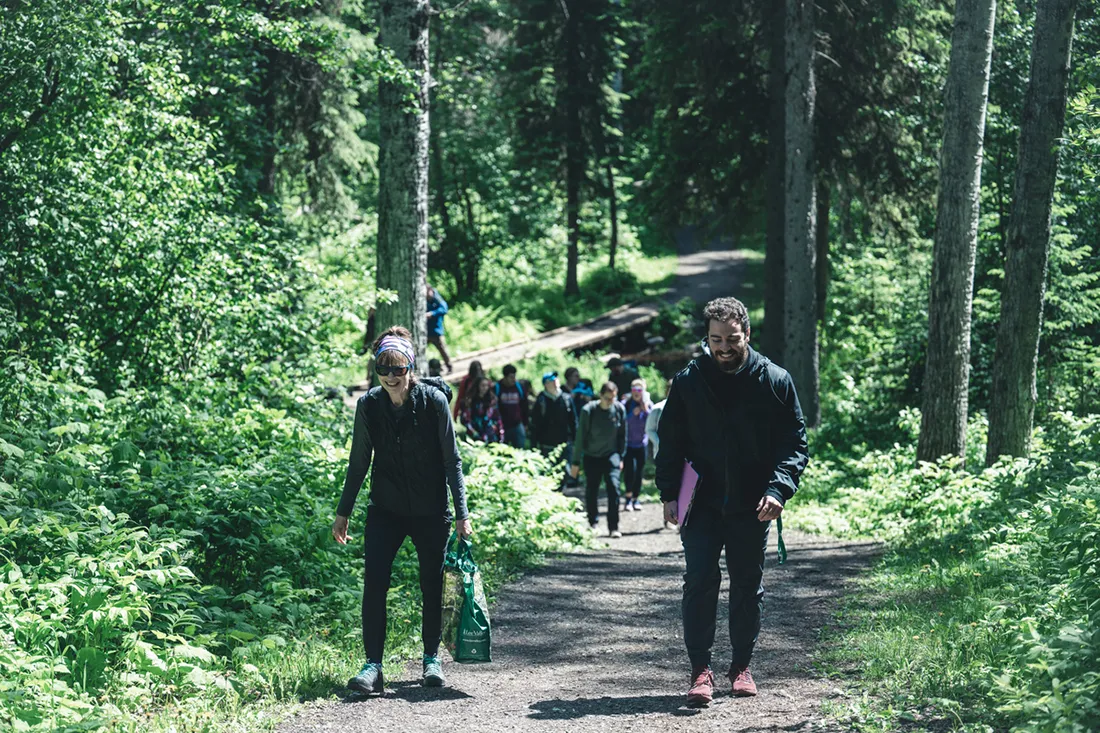
UNBC strives to improve understanding of the evolving needs of northern and rural communities from a range of disciplinary perspectives, to inform public policy and practice, and empower community decision-making. Indigenous and non-Indigenous communities across northern and rural British Columbia and Canada are faced with planning for the future in the face of a range of complex, nuanced, and interconnected social, economic, health, and environmental pressures. Frequently dependent on natural resource-based industries and subject to the vulnerability this engenders in an increasingly globalized economy, northern and rural communities have struggled to remain viable and are actively searching for opportunities to enhance both stability and resilience. UNBC researchers are enthusiastically engaged in applied, collaborative, community based, and interdisciplinary research addressing complex challenges and seeks to foster community engagement and empowerment. Of note, for over two decades, UNBC’s Community Development Institute (CDI) has worked in partnership with communities, industry, business, non-profit and community organizations, First Nations, and all levels of government, to address cultural, social, and economic development challenges and to develop and implement strategies for economic diversification and community resilience.
Example research areas
- An understanding of the interwoven factors that contribute to communities remaining resilient in the face of change and challenges.
- Analysis of globalization processes affecting the societies, cultures, and economies of northern British Columbia and similar regions, including population aging, workforce renewal, a growing Indigenous population, and increased international immigration.
- Exploration and development of the culture and cultural economy and service needs of small cities and rural communities and their contribution to quality of life.
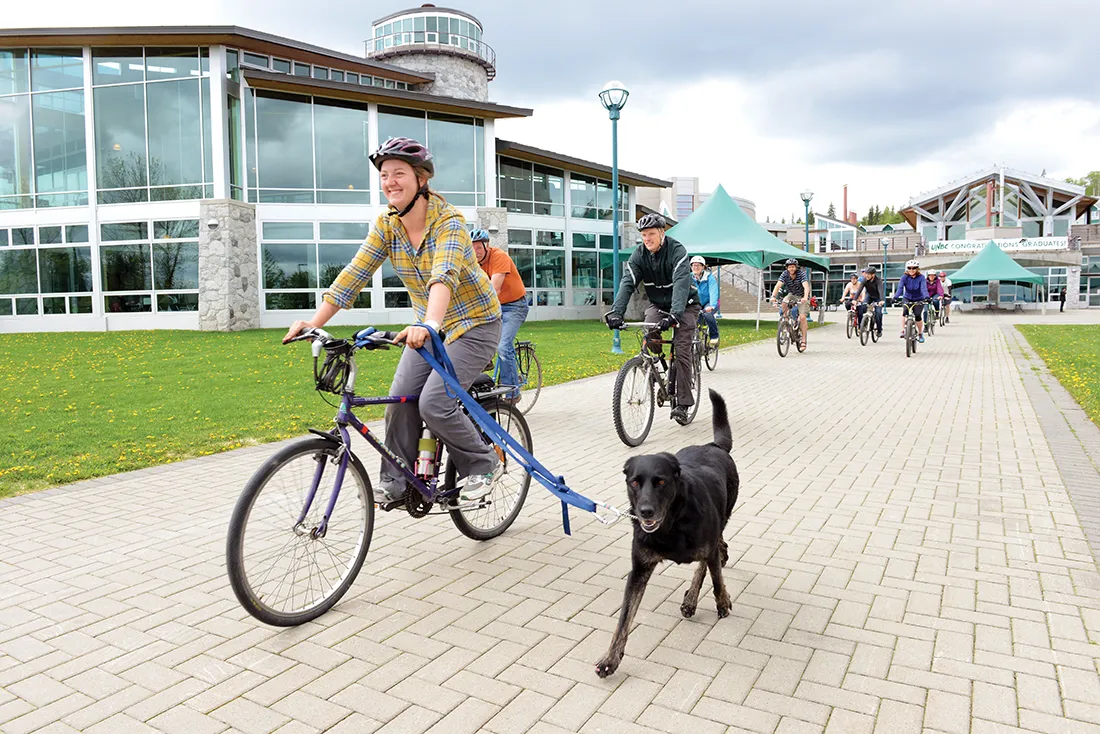
Canadians who live in rural and northern regions have a reduced health status and health outcomes that are markedly worse than those of their urban and southern fellow citizens. Factors contributing to these disparities include lack of access to a full range of healthcare services and providers, lifestyle, socio-economic status, and environmental sustainability. Such disparities are even greater for Indigenous Peoples who experience significantly higher morbidity and mortality rates, greater inequities in access to healthcare, and systemic racism. The health and social determinants that produce these disparities include individual, community, population, systems, and environmental factors, necessitating a collaborative and comprehensive approach to the study of
health, society, and well-being.
UNBC researchers conduct broad interdisciplinary research, spanning basic sciences and biomedical research, creative social sciences and humanities, economics and business studies, education and politics, and applied clinical and health services research. This research has wide ranging impacts on health, society, and well-being. Of note, the Health Research Institute (HRI) supports health researchers to connect, convene, and collaborate across the many disciplines concerned with health and its determinants, and to foster innovative research and partnerships across UNBC and beyond. A unique Memorandum of Understanding between UNBC and the Northern Health Authority also supports the HRI mission to facilitate the creation and translation of knowledge that will enhance the health and well-being of individuals, families and communities. Likewise, the Centre for Technology Adoption for Aging in the North (CTAAN) is a national innovation hub that supports aging in northern and rural communities by integrated innovative technology for older adults, caregivers, and related health systems.
Example research areas
- Identification of the determinants of health status across diverse populations, including Indigenous, rural, and northern communities.
- Understanding of health services and health human resources, and the development of enhanced models of service delivery and health professional education.
- Application of arts and humanities in health and medical sciences to advance anti-oppressive healthcare.
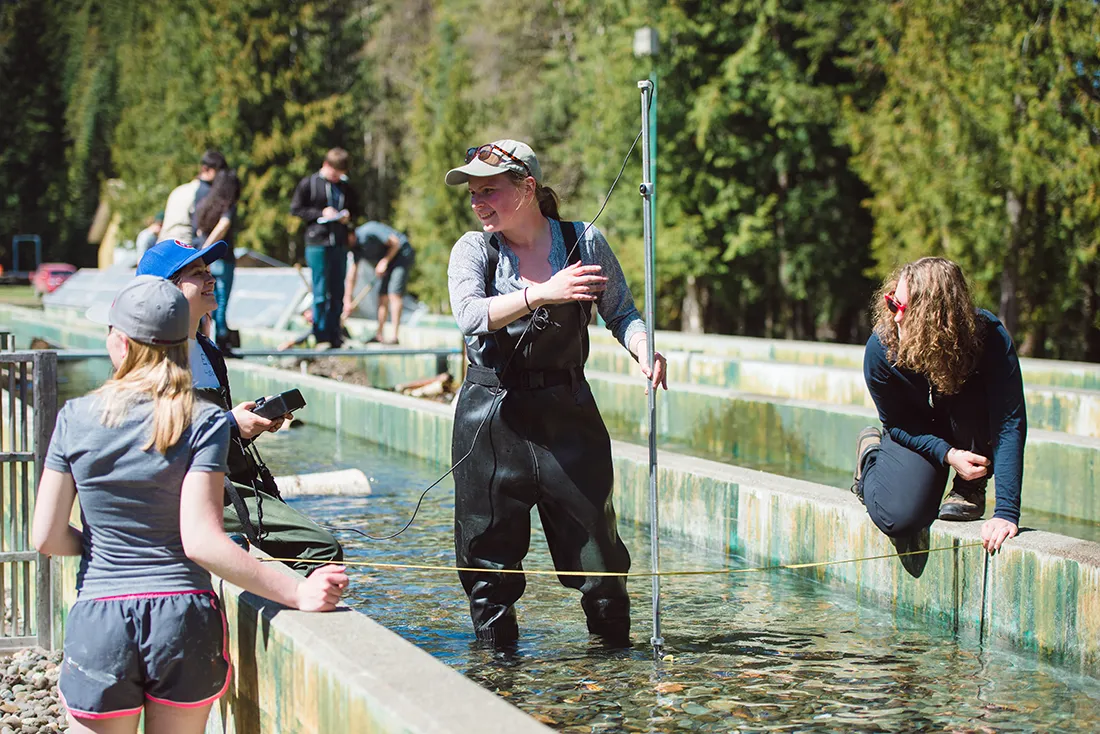
Grounded in curiosity and in response to local and global challenges, UNBC researchers in science and technology work to advance knowledge, understand the complexities of nature, and to develop tools to shape the future. As a research-intensive university embedded within the dynamic and resource-rich northern region of British Columbia, UNBC is uniquely positioned to leverage its expertise, partnerships, and regional strengths to drive impactful innovations. Through this, we work to foster a thriving ecosystem that supports the development and commercialization of ideas generated by our students, faculty, and partners, ensuring they benefit society and contribute to regional, national, and global progress.
At UNBC, the Northern Analytical Laboratory Services (NALS) is an environment and climate solutions innovation hub leading research and testing in analytical, environmental, and material chemistry. The Wood Innovation Research Lab (WIRL) provides students, faculty members, and industry/endowed research chairs with the ability to build and test large-scale, integrated wood structures using engineered wood products such as cross-laminated timber, glue-laminated timber, and laminated veneer lumber.
Example research areas
- Biological, chemical, environmental, and engineering systems.
- Technology and innovation to advance health and society.
- Identification and formulation of place-based sustainable options for economic diversification.
Strategic priority actions
Through our engagement activities, we worked to identify and explore emerging trends and research support needs and priorities.
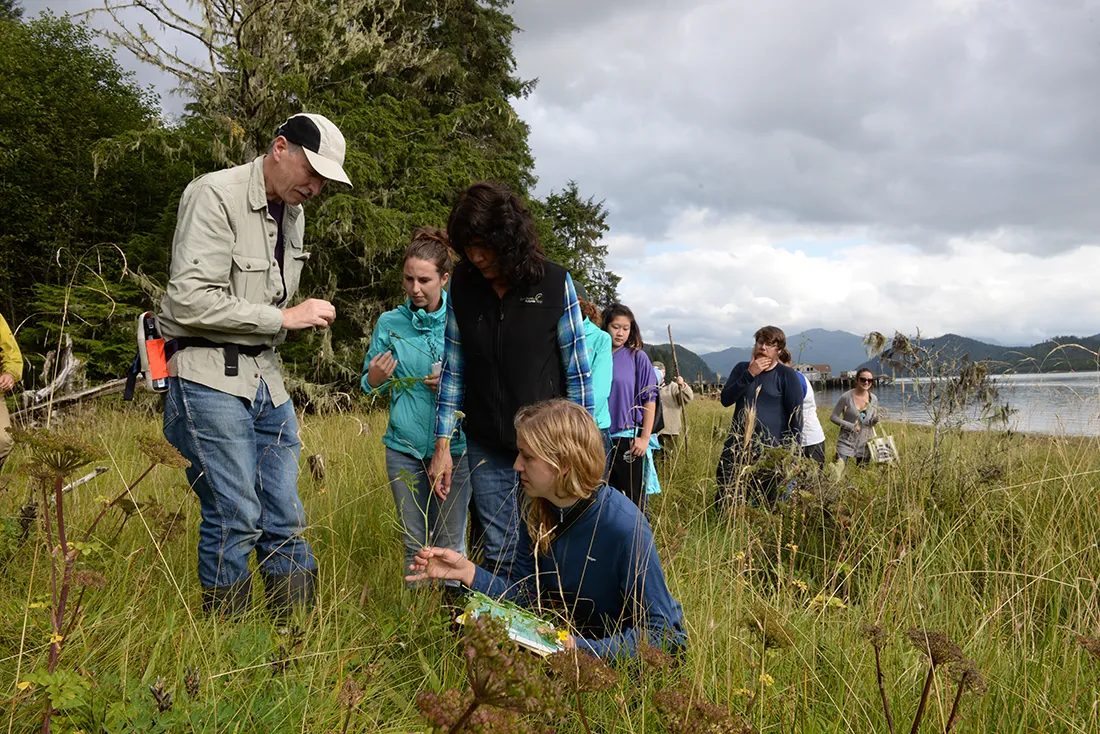
Six core priority action areas were generated. These will provide a pathway for research and innovation over the coming five years and will guide us as we endeavour to meet the needs of rural, remote, northern, and Indigenous communities, locally to globally, through research.
The six core priority action areas include:
Excellent and impactful research is contingent on practical supports to strengthen, sustain, and grow research capacity at UNBC, allowing researchers to work to their best and achieve their highest potential.
- Enhance, diversify, and support relationships with citizens, communities, funders, research partners, and industry.
- Prioritize, support, and invest in research that responds to local and global challenges, including truth and reconciliation and climate action.
- Develop strategic research areas through increased external funding.
- Strengthen, sustain, and support research centres, forests, and institutes at UNBC.
- Provide access to specialized research supports, including statisticians.
- Develop comprehensive resources and infrastructure to assist students and faculty in navigating the innovation life cycle, from idea generation to market entry.
“UNBC can support communities to be ready for the realities of climate change and the ongoing events to come … Research can serve and impact communities locally, but can also lead and contribute globally."
– Faculty, UNBC Prince George
To sustain and promote research activity at UNBC, we must manage our support programs (e.g., administrative, financial, facilities, field operations, and research equipment) in innovative ways that provide the best service and access for faculty and students, and the best value to our communities and partners.
- Enhance and streamline research administration processes and systems to increase efficiency and support faculty to do their best work.
- Clear and transparent policies and procedures for allocation of resources.
- Investment in adaptable, enhanced, and flexible research space, infrastructure, equipment, and support across all UNBC campuses and facilities.
- Develop additional pathways to optimize, monitor, and showcase research impact.
- Optimization of access to research facilities and space at UNBC, including equitable, fair, and transparent allocation of research office and laboratory space.
- Support for consistent and complete regulatory compliance for research.
UNBC recognizes the importance of attracting and retaining outstanding faculty to enable the university to continue to build on the extent and merit of its research portfolio.
- Attract, retain, and invest in outstanding researchers, especially from equity-deserving and under-represented groups, to work at or with UNBC, contributing to a vibrant research environment.
- Promote inclusive spaces that foster collaboration, innovation, interdisciplinarity, and impact.
- Enhance UNBC’s profile by highlighting the diverse research achievements and contributions of faculty.
- Create strategic supports to amplify visibility of achievements of researchers from equity-deserving and under-represented groups.
- Establish formalized pathways for mentorship and support to empower and guide new faculty.
“We need to continue to be aspirational and to lead research that is nimble and adaptable to the world in which we live in … we need to continue to be relevant locally, provincially, nationally, and globally.”
– Dr. Geoff Payne, President, UNBC
Students and research trainees continue to be a critical part of UNBC’s research ecosystem. There will be a continued strong emphasis on supporting research experiences for students at all levels and research trainees, including postdoctoral research fellows.
- Enhance support for students and trainees at all levels across the research life cycle.
- Expand funding opportunities to support and retain engagement of undergraduate students in research, including paid research opportunities and internships.
- Create new pathways of support for Indigenous students and research trainees.
- Raise awareness of graduate and research trainee pathways among undergraduate students at UNBC.
- Support opportunities for students and postdoctoral research fellows to present and disseminate their work.
“I was able to easily get involved in research and work alongside my professors, I was even given my own project, something I never expected as an undergrad student.”
– UNBC Student, Prince George
Collaborative research partnerships are an area of significant strength for UNBC and continue to be critical to UNBC’s mission and overarching strategic plan Ready.
- Foster meaningful, reciprocal, and respectful partnerships with Indigenous Peoples and communities.
- Support the development of bold and dynamic partnerships with community organizations, industry, not-for-profits, and others to foster new opportunities for exploration, innovation, and entrepreneurship.
- Create linkages across faculties to maximize boundary-crossing and interdisciplinary research partnerships and impacts across all UNBC sites and beyond.
- Strengthen collaborations with industry, government, and Indigenous communities to co-develop innovations that contributes to the resilience and diversification of the regional economy and addresses societal challenges.
- Increased collaboration with other research-intensive universities across Canada and worldwide.
"UNBC researchers make a difference by collaborating and building relationships, and when trust is established, a new path forward is created with our Indigenous communities, we then can explore different ways of knowing and being.”
– Elder McIntosh
The mobilization of knowledge is critical for researchers and ensures that research findings get into the right hands and in an expedient manner. We aspire to not only be excellent in ‘traditional’ methods of dissemination, such as publishing books, articles, and reports, but also in other forms of knowledge translation, such as public scholarship, workshops, and creative activities.
- Promote knowledge mobilization across the research continuum, from discovery to impact.
- Enhance innovative knowledge dissemination methods and technology.
- Increase engagement of students and research trainees in knowledge mobilization.
- Increase visibility of UNBC research.
- Support for diverse forms of knowledge mobilization, including adoption of open science and the Declaration on Research Assessment (DORA) principles.